#icd 10
Text
Core schizoid traits and criteria
From the Psychodynamic Diagnostic Manual (2006):
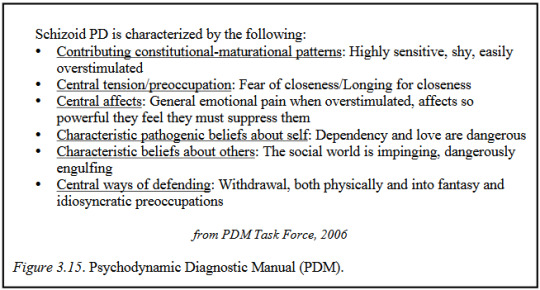
From the DSM-IV-TR (2000) and the ICD-10 (2019):

Guntrip's core traits (1969):
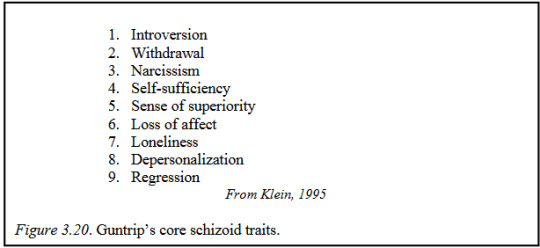
In the SWAP-200 personality assessment:

From the DSM-5-TR (2022):


The ICD-11 (2022) doesn't have a specific schizoid diagnosis, but it's detachment trait domain in its personality disorder traits section is similar to SzPD:
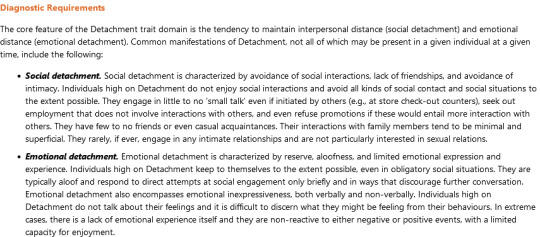
From Zachary Wheeler, Treatment of Schizoid Personality [dissertation] (2013); the DSM-5-TR (2022), & the ICD-11 (2022).
#szpd#szpd info#pd info#pdm#dsm-iv-tr#dsm iv tr#icd 10#icd-10#dsm-5-tr#dsm 5 tr#icd 11#icd-11#harry guntrip#zachary wheeler#swap-200#swap 200#described in alt text#described#dogpost#long post#diagnostic criteria
73 notes
·
View notes
Text
New ICD-10 code proposal:
S99.01B Sometimes it be like that
Specifically to be used for:
- periods that were skipped, late, or a little heavier than usual
- physiologic vaginal discharge
56 notes
·
View notes
Note
I'm so sorry if you've gotten this question a thousand times, but do you have any non-biased list of ASPD symptoms or things people with ASPD tend to do/think? I've been questioning if I have it but I can't find any list of symptoms that isn't extremely ableist
Well, part of that is because the diagnostic criteria's phrasing is pretty ableist. I can give you a quote from the most recent DSM (DSM-V TR, 2022) which is the book that professionals in the USA diagnose out of. I cannot give you the current criteria for ASPD outside of the US, because the ICD-11 has gotten rid of individual personality disorders in favor of a general "Personality Disorder" diagnosis with 3 severities but no clusters or individual disorders. I can give you the previous criteria from ICD-10, however.
(From DSM-V TR, 2022 - "Antisocial Personality Disorder, Diagnostic Criteria")
"A. A pervasive pattern of disregard for and violation of the rights of others occurring since age 15 years, as indicated by three (or more) of the following:
1. Failure to conform to social norms with respect to lawful behaviors, as indicated by repeatedly performing acts that are grounds for arrest
2. Deceitulness, as indicated by repeated lying, use of aliases, or conning others for personal profit or pleasure.
3. Impulsivity or failure to plan ahead
4. Irritability and aggressiveness, as indicated by repeated physical fights or assaults.
5. Reckless disregard for safety of self or others
6. Consistent irresponsibility, as indicated by repeated failure to sustain consistent work behavior or honor financial obligations.
7. Lack of remorse, as indicated by being indifferent to or rationalizing having hurt, mistreated, or stolen from another
B. The individual is at least age 18 years.
C. There is evidence of conduct disorder with onset before age 15 years.
D. The occurrence of antisocial behavior is not exclusively during the course of
schizophrenia or bipolar disorder."
The important thing to remember is that the DSM specifically states it is not meant to be used like a cookbook, where a list of ingredients makes a final outcome. That is to say, having ASPD isn't as simple as having 3/7 of the numbered criteria and fitting the lettered criteria. There is nuance to understanding what ASPD looks like and feels like, the diagnostic and associated features sections, development criteria that must also make sense (aka what, as far as we currently know, are either genetics and/or environments that cause ASPD) within your life experience, as well as differential diagnosis to make sure the symptoms don't fit better elsewhere.
The associated features section of the DSM-V TR section on ASPD is fairly long, so I am unable to put all of that here.
The differential diagnosis section of the DSM specifically mentions a few types of disorders to look out for that may appear to be ASPD based on symptoms alone, which I can list here.
Substance Use Disorder: If someone would also qualify for a substance use disorder diagnosis, then ASPD is only diagnosed if ASPD symptoms were present from young childhood and to present day. Both can be diagnosed, even if both were present in childhood and adulthood, but it is not ASPD if no ASPD traits were shown in childhood prior to the use of substances.
Schizophrenia and Bipolar disorders: If ASPD symptoms are only present during episodes associated with Bipolar disorder (manic episodes) or Schizophrenia (psychosis), then that isn't considered ASPD.
Other Personality Disorders: ASPD *can* co-occur with other personality disorders, but you want to research all of them to be certain that it a different PD doesn't fit better than, rather than in addition to, ASPD.
(From ICD-10 Dissocial Personality Disorder)
"Personality disorder characterized by disregard for social obligations, and callous unconcern for the feelings of others. There is gross disparity between behaviour and the prevailing social norms. Behaviour is not readily modifiable by adverse experience, including punishment. There is a low tolerance to frustration and a low threshold for discharge of aggression, including violence; there is a tendency to blame others, or to offer plausible rationalizations for the behaviour bringing the patient into conflict with society."
(It is worth noting the word "gross" used in the phrase gross disparity is referring to a secondary definition of gross, meaning large/important/marked/prominent. They are not being bluntly ableist on main in the ICD).
In the ICD, they note exclusions, which I believe is similar to the differential diagnosis section in the DSM, for Emotionally Unstable Personality Disorder (BPD) and Conduct Disorders.
Overall, this criteria has its own serious issues for both versions, but it is the diagnosing criteria (current for the DSM and recent but not current for the ICD, as mentioned above) for Antisocial/Dissocial Personality Disorder and therefore needs to be a part of any research into self diagnosis.
I would highly recommend looking into the DSM entry itself for ASPD as it is lengthy but thorough (and yes, somewhat stigmatizing) in its explanation of how ASPD tends to present itself. Putting the term PDF after DSM-V TR definitely does (cough) not (cough) produce some results that would aid you in this, and idk why anyone would do that when there is a perfectly legal way to buy the DSM for over $100 for a PDF version.
I hope this helps!
#aspd-culture-is#aspd culture is#aspd culture#actually aspd#aspd#aspd awareness#actually antisocial#antisocial personality disorder#aspd traits#dsm v#dsm v tr#dsm#icd 10#icd 11#icd#icd10#icd11#anons welcome
9 notes
·
View notes
Text
Y92.253? now that's what i call Frasier coded!
0 notes
Text
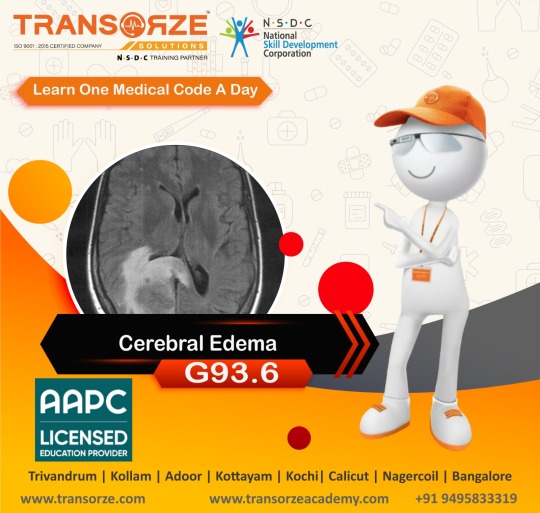
ICD-10 code G93. 6 for Cerebral edema is a medical classification as listed by WHO under the range - Diseases of the nervous system.
For more details:
🌐 www.transorze.com
☎️ 9495833319
#medical coding#icd 10#cerebral edema#health#brain disorder#nervous system#hospitals#medical sector#transorze calicut#transorze dubai#transorzesolutions
1 note
·
View note
Text
Memahami Kode ICD ISK: Panduan Menyeluruh untuk Pemahaman dan Penerapannya
Halo pembaca setia, kali ini kita akan membahas sebuah topik yang cukup spesifik namun penting, yaitu tentang "Kode ICD ISK". Tidak perlu bingung, mari kita mulai pembahasan dengan mengetahui apa itu Kode ICD.
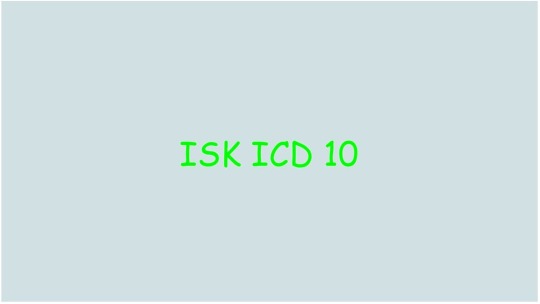
Baca Juga : ICD 10 ISK
Kode ICD (International Classification of Diseases) adalah sebuah standar internasional yang digunakan untuk penyandian diagnosa penyakit. Dengan adanya kode ini, para tenaga medis dapat dengan mudah mengidentifikasi dan melacak jenis-jenis penyakit yang ada. Terutama pada kondisi yang spesifik seperti ISK (Infeksi Saluran Kemih).
ISK adalah sebuah kondisi dimana bakteri memasuki saluran kemih dan mengakibatkan infeksi. Kondisi ini umumnya lebih sering terjadi pada wanita dibandingkan pria. Hal ini disebabkan oleh struktur anatomi tubuh wanita yang memungkinkan bakteri lebih mudah memasuki saluran kemih.
Kode ICD untuk ISK memiliki kegunaan yang penting. Selain memudahkan tenaga medis dalam melacak dan mendiagnosa penyakit, kode ini juga membantu dalam penelitian dan pengumpulan data statistik kesehatan. Dengan begitu, penanganan dan pencegahan ISK dapat lebih optimal.
Simak Juga : Kode ICD 10 ISK
Memahami kode ICD untuk ISK mungkin terasa rumit, tetapi ini sangat penting bagi profesional kesehatan. Sehingga pemahaman yang baik tentang kode ini bisa membantu penanganan pasien menjadi lebih efektif dan efisien.
Namun, bukan berarti bagi kamu yang bukan tenaga medis tidak perlu memahami kode ICD ini. Memiliki pemahaman tentang ini dapat membantu kita untuk lebih mengerti tentang kondisi kesehatan kita sendiri atau orang terdekat.
Ada beberapa kode ICD yang berhubungan dengan ISK. Contohnya, kode N39.0 yang merujuk pada ISK tanpa komplikasi. Sedangkan N39.8 merujuk pada kondisi ISK dengan komplikasi tertentu. Setiap kode ini memiliki makna dan interpretasi yang berbeda-beda.
Dalam praktiknya, tenaga medis akan mendiagnosa pasien berdasarkan gejala dan temuan medis, kemudian menentukan kode ICD yang sesuai. Kode ini akan digunakan untuk merencanakan perawatan, melacak perkembangan kondisi, dan sebagai referensi untuk penelitian.
Mungkin ada pertanyaan, mengapa kita perlu tahu kode ICD ini? Sederhana, dengan memahami kode ini, kita bisa mengetahui kondisi kesehatan kita secara lebih spesifik. Jadi, kita bisa lebih aktif dalam menjaga kesehatan kita sendiri.
Jadi, bagaimana caranya memahami kode ICD ini? Pertama, kamu bisa melihat langsung pada panduan ICD yang dikeluarkan oleh WHO (World Health Organization). Selain itu, banyak juga sumber online yang bisa membantu memahami kode ini.
Namun, ingatlah bahwa memahami kode ini bukan berarti kamu bisa mendiagnosa diri sendiri. Meski kita bisa tahu kode ICD dari penyakit tertentu, tetap saja kita perlu konsultasi dengan dokter atau profesional kesehatan.
Jadi, apakah kamu sudah mengerti tentang Kode ICD dan ISK? Semoga artikel ini bisa membantu kamu untuk lebih memahami tentang hal ini. Jangan lupa untuk selalu menjaga kesehatan dan konsultasi dengan dokter secara rutin.
Tetap semangat dalam mencari ilmu dan memahami berbagai hal baru. Semoga artikel ini bisa bermanfaat dan memberikan pengetahuan baru bagi kamu. Jangan ragu untuk mencari informasi lebih lanjut jika kamu merasa penasaran.
Demikian penjelasan tentang kode ICD ISK. Semoga setelah membaca artikel ini, kamu bisa memahami apa itu kode ICD, apa itu ISK, dan bagaimana hubungan antara keduanya. Ingatlah, pengetahuan adalah kunci untuk pemahaman dan kesehatan yang lebih baik.
Terima kasih sudah menyempatkan waktu untuk membaca artikel ini. Semoga informasi yang disampaikan bisa menambah wawasan dan pengetahuan kamu. Jangan lupa untuk selalu menjaga kesehatan dan rutin melakukan check-up kesehatan.
Sampai jumpa kembali di artikel menarik lainnya. Tetap semangat belajar dan menjaga kesehatan! Selamat beraktivitas dan sampai jumpa di kesempatan berikutnya!
Sumber : ISK ICD 10
1 note
·
View note
Text
ICD-10 CM Codes | Medical Diagnosis ICD 10 Codes List - Jindal Healthcare
Explore comprehensive guide to ICD-10 codes, providing a valuable resource for accurate medical coding. Simplify the coding process and ensure compliance with Jindal Healthcare. For more details, visit https://www.jindalhc.com/icd-10-codes/
0 notes
Text
Guide About Vascular Surgery Billing Service
Vascular surgery billing requires a strong skill-set to manage in an effective and sustainable manner. Practices across the United States have benefited from vein & vascular surgery billing services and witnessed an increment in the overall revenues. This is a result of a pragmatic and focused approach to medical billing for vascular surgery and billing companies are willing to guide practices for better Revenue Cycle Management (RCM) as well. Hence, you will definitely get the best value for money by partnering with us in the medical billing domain.
Medical Billing for Vascular Surgery
It is often reported by vascular surgeons that their hectic routines do not allow them to adequately submit their reimbursements, leading to delays and denials. This is why vascular surgery medical billing services are considered to be highly critical for vascular surgeons, contributing to proficient collections from patients and insurance companies. However, not many medical billing companies are well-versed with the vein and vascular billing coding and other particularities of the process. This is where you can feel free to contact a professional medical billing company like I-Med Claims LLC for specialized vascular billing services provided by some of the market’s best vascular surgery billing consultants.
We consider ourselves to be one of the best in Vascular billing services across the United States. Although it comes across as a highly bold statement, it is based upon our proficient mechanisms that ensure a smooth RCM for practices. Our primary motive is to provide that crucial autonomy and independence to small-scale practices, allowing them to focus on the bottom-line. Therefore, more and more vascular surgeons have turned to us for their vascular surgery billing needs.
Outsourcing Vascular Surgeons Billing for Higher Revenues
According to reports, it is common that almost 20% of a vascular surgeon’s overall claims remain unclaimed owing to defects in coding or various other ineffective collection strategies. This is why practices prefer to outsource their medical billing to US medical billing companies for speedy payment collections from insurance companies. With a 99% claim reimbursement rate, organizations such as I-Med Claims LLC guarantees to eliminate that 20% gap in your collectible revenue. As a result, higher revenues are witnessed after outsourcing your vascular surgery billing because your coding and revenue cycle management will improve.
In case you’re confused about how to contact a credible medical billing company, just go to your browser and type, “vein & vascular billing service near me”. Suddenly a list of the top vascular billing companies will pop up and you have to choose the one which is coherent with your needs. There is a small matrix that helps you with this process as well, and you can get all the guidelines on how to choose the right medical billing company for your needs.
Avoid Home Billers and Freelance Medical Billing
Vascular surgery billing is considered to be a complicated endeavor as it requires a strong expertise with vascular billing codes such as the ICD-10. Such expertise allows surgeons to effectively file claims for revenue collection payments. To provide expert vascular billing services, the vascular billing professionals are well-equipped with the technical prowess and coding proficiency required to tackle all complications and complexities occurring in the process.
On the other hand, some vascular surgeons can end up outsourcing to an inexperienced vascular billing company. This can harm their overall revenue cycle management as risks are elevated due to negligence by novice billers. In addition to this, some practices tend to outsource to freelance billers or home billers. The problem with such an approach is that the home billers do not work in a professional and controlled environment, leading to irregularities in their work.
Vascular Surgery EHR Billing Software and Coding
In order to sufficiently track all underpayments and ensure a smooth RCM, it is important that the medical billing company is fully equipped with the latest software updates. This is where the vascular surgery EHR billing and coding software comes in handy. The medical billing experts have the best equipment at their disposal along with a professional environment, leading to productive service provision. Partnering with a medical billing company means to have a resource available to practices that ensures insurance follow ups and solving of all complications in the claim reimbursement process.
Why Choose a Professional Medical Billing Company for Vascular Billing?
As mentioned above, it is important for vascular surgeons to choose quality medical billing for their claim submissions to patients and insurance companies. This means that a professional medical billing organization will make it easy for vascular surgeons to navigate through the various billing landmines mentioned above. The credit goes primarily to the professional working environment at such companies along with the updated and effective tools at their disposal. Such a capacity enables the vascular billing professionals to provide you with the best bang for your buck, and elevate your revenues in a short span of time.
#healthcare#medical billing#health#medical#practice management#vascular#vascular surgery#vascular surgery billing#billing company#vascular billing#EHR billing#revenue#icd 10#insurance#revenue cycle management
0 notes
Text
they're adding deangirlism to the DSM-V
#um.txt#the americanisation of cliveguy.tumblr.com sorry but whod know what i was on about if i said the ICD-10
175 notes
·
View notes
Text
Other Personality Disorders
This post is about personality disorders that used to exist in the DSM or ICD but don’t anymore. You cannot be diagnosed with these disorders, as they’re not in any diagnostic manual; you would be diagnosed with Other Specified Personality Disorder (or the ICD-11 equivalent) instead.
Passive-Aggressive / Negativistic (PA/NegPD)
A pervasive pattern of negativistic attitudes and passive resistance to demands for adequate performance, beginning by early adulthood and present in a variety of contexts.
Masochistic / Self-Defeating (Ma/SDPD)
A pervasive pattern of self-defeating behavior, beginning by early adulthood and present in a variety of contexts. The person may often avoid or undermine pleasurable experiences, be drawn to situations or relationships in which he or she will suffer, and prevent others from helping him or her.
Sadistic (SaPD)
A pervasive pattern of cruel, demeaning, and aggressive behavior, beginning by early adulthood and present in a variety of contexts.
Depressive / Melancholic (De/MePD)
A pervasive pattern of depressive cognitions and behaviors, beginning by early adulthood and present in a variety of contexts.
Other Personality Disorders
Turbulent
Turbulent PD has never existed in any DSM. It’s part of Millon’s theorised personality disorder taxonomy, but doesn’t appear in any other literature.
It seems to be an alternate way of categorising and defining hypomania & cyclothymic disorder, and is similar to ADHD, NPD & HPD.
Millon classes it on a spectrum from ebullient personality type -> exuberant personality style -> turbulent personality disorder.
Haltlose
Theorised in German, Russian, and French psychiatry.
Haltlose translates to “unstable” (literally, “without footing”) and refers to a “drifting, aimless and irresponsible lifestyle: a translation might be ‘lacking a hold' on life or onto the self)”.
“Those with haltlose personality disorder have features of frontal lobe syndrome, sociopathic and histrionic personality traits”.
Someone with haltlose PD “lacks concentration and persistence”, and “lives in the present only”. They are “easily persuaded, and [are] often led astray”.
Haltlose PD is similar to AsPD as there is “an inability to learn from experience, and no sincere sense of remorse”. They are often described as ‘lovable rouges’.
(Cullivan, R, ‘‘Haltlose’ type personality disorder (ICD-10 F60.8)’, Psychiatric Bulletin, 1998, pp. 58-59).
Immature
Immature PD was mentioned in the DSM-III as a specifier for Other Specified PD, but removed in later editions.
It seems to be a combination of borderline, histrionic, narcissistic, antisocial, dependent, schizoid and avoidant PDs.
Almeida et al. suggest the following criteria for Immature PD: irresponsibility; impulsivity; unreliability; easily swayed; mood swings; expect overindulgence from others; dependency on others; ability for remorse or regret but it’s “light and fleeting”; inability to manage assets; inability to follow plans; quick to lie; unable to delay gratification; quick to frustration; devaluation of others; risk-taking behaviour; unstable relationships and behaviour; feels both entitled and worthless; attention seeking; recklessness; shyness; ungrateful; over-familiar with others; unable to plan for the future; substance use.
They also suggest 3 subtypes of Immature PD: the dramatic and emotional subtype, the shy subtype, and the mixed subtype.
(Almeida et al., 'Immature Personality Disorder: Contribution to the Definition of this Personality', Clinical Neuroscience & Neurological Research, 2019, pp. 1-16).
Eccentric and Psychoneurotic
These two personality disorders existed only as ‘other specified’ PDs in the ICD-10, where no definition is given.
#pd info#other specified personality disorder#personality disorders#dsm#icd#icd 10#dsm-iii#dsm iii#eccentric personality disorder#psychoneurotic personality disorder#immature personality disorder#haltlose personality disorder#turbulent personality disorder#passive aggressive personality disorder#negativistic personality disorder#masochistic personality disorder#self defeating personality disorder#sadistic personality disorder#depressive personality disorder#melancholic personality disorder#long post#dogpost#unrelated but that immature pd paper was all over the place... your diagnostic criteria cant be 2 pages long!#your diagnosis cant just be a combination of 7 other pds!#does NOT make sense.#ospd
38 notes
·
View notes
Text
last day at my field and work place today after 8 months of being there 🥺 I got flowers, and such beautiful words of good bye 🥺 it hurts a little because I grew so very fond of my coworkers, but I really do want my degree so! back to school on Monday I go!


6 notes
·
View notes
Text
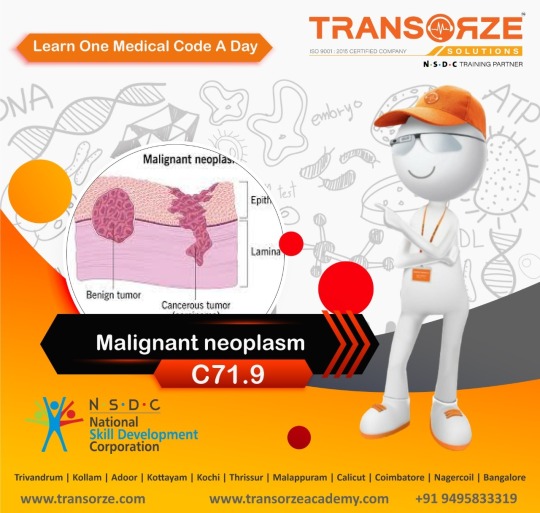
ICD-10 code C71.9 for Malignant neoplasm of brain, unspecified is a medical classification as listed by WHO under the range - Malignant neoplasms.
For more details:
🌐 www.transorze.com
☎️ 9495833319
#medical coding#icd 10#brain#disorder#human disorder#brain disorder#healthcare#medical jobs#career opportunities#transorzesolutions
0 notes
Text

Got a new tattoo!!
F64.0 - diagnosis code for Transsexualism
Z72.25 - diagnosis code for High Risk Homosexual Behavior
3 notes
·
View notes
Text
My favorite code from the ICD-10 is 7+W61.32 - Struck by chicken, what's yours
4 notes
·
View notes